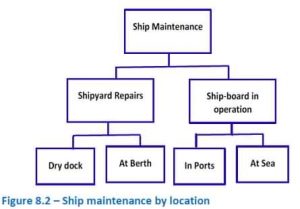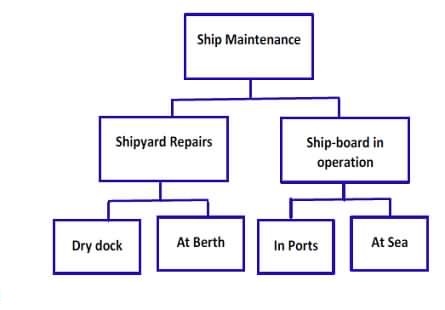Marine maintenance systems for ships’ hull and machinery are essential to ensure the vessel’s safety, efficiency, and reliability. These systems help to minimize operational costs, extend the service life of the vessel, and comply with regulatory requirements. Some common marine maintenance systems for ships’ hull and machinery include:
Hull Inspection and Maintenance:
- Underwater hull inspections: Regular inspections of the hull’s underwater section, including visual inspections and non-destructive testing methods such as ultrasonic thickness measurement (UTM).
- Dry-docking: Periodic dry-docking of the vessel to inspect and repair the hull, propeller, and rudder.
- Hull cleaning: Regular cleaning of the hull to remove fouling, which can reduce fuel consumption and increase vessel efficiency.
- Anti-fouling systems: Application of anti-fouling coatings or installation of an impressed current cathodic protection (ICCP) system to minimize marine growth and corrosion.
Machinery Maintenance:
- Planned maintenance system (PMS): A systematic approach to schedule and track maintenance tasks for the ship’s machinery, including engines, pumps, compressors, and other equipment.
- Condition-based maintenance (CBM): Monitoring the condition of the ship’s machinery using sensors, vibration analysis, oil analysis, or thermography to identify potential issues and plan maintenance accordingly.
- Preventive maintenance: Regular maintenance activities, such as lubrication, filter replacement, and alignment checks, to prevent equipment failure and extend machinery life.
Propulsion System Maintenance:
- Engine overhauls: Periodic overhauling of the main and auxiliary engines to inspect, repair, or replace worn components.
- Fuel system maintenance: Regular inspection and maintenance of fuel injection systems, including fuel pumps, injectors, and filters.
- Turbocharger maintenance: Inspection, cleaning, and repair of turbochargers to ensure optimal performance and efficiency.
Electrical and Automation System Maintenance:
- Inspection and testing of electrical equipment: Regular checks of electrical systems, including switchboards, generators, and motors, to ensure proper function and compliance with safety standards.
- Calibration and maintenance of sensors and instrumentation: Ensuring the accuracy and reliability of shipboard sensors, gauges, and control systems through regular calibration and maintenance.
- Maintenance of automation systems: Regular software updates, hardware maintenance, and system checks for the ship’s automation and control systems.
Safety and Firefighting Equipment Maintenance:
- Inspection and maintenance of life-saving appliances: Regular checks and servicing of lifeboats, life rafts, life jackets, and other life-saving equipment.
- Firefighting equipment maintenance: Periodic inspection and servicing of fire extinguishers, fire pumps, hoses, and fixed firefighting systems, such as CO2 or foam systems.
Implementing these marine maintenance systems helps ensure the operational efficiency, safety, and regulatory compliance of ships’ hull and machinery.
Ship maintenance is a complex and ongoing process that requires a high level of expertise and attention to detail. Proper maintenance is critical to the safe and efficient operation of marine vessels and must be conducted in accordance with all regulatory and safety requirements.

The International Safety Management Code (ISM) provides regulations and guidelines for maintenance management in the shipping industry. One of the key provisions of the ISM Code is that each ship operator is responsible for the safe and pollution-free operation of their vessel, including the maintenance and operation of the hull, machinery, and equipment in accordance with relevant rules and regulations. The ISM Code also provides guidelines for the maintenance of the ship and its equipment, including regular inspections, reporting non-conformities, and implementing corrective actions.
The development of a maintenance management system on board a vessel is critical for the safety and efficiency of ship operations. A database containing a register of all equipment on board that needs to be maintained is the foundation of the maintenance management system. Maintenance plans, activities carried out, and full maintenance history should be recorded in this database.
Effective maintenance planning is essential for ship operation due to its complexity and the obligations of shipping organizations to comply with specific regulations and requirements, including ISM. The industry is moving towards more advanced routines for non-intrusive inspections, including condition-based maintenance and reliability-based maintenance.
There are different types of maintenance policies, and the shipping company usually selects the most appropriate type based on its maintenance policy or strategy. Unplanned maintenance involves repair or replacement only when a failure occurs, while planned maintenance scheduling or planning is based on a defined schedule of equipment maintenance. Preventive maintenance is a subset of planned maintenance, where maintenance is performed on a planned basis within fixed scheduled intervals. Predictive maintenance is based on condition-based maintenance, where the maintenance decision is based on the current condition or reliability of the system or equipment. Reliability Centered Maintenance (RCM) is a structured way to determine the maintenance requirements of complex systems and assets. Corrective maintenance is maintenance carried out after failure detection.

Ship maintenance and repair activities can be completed in two different ways, either in a ship repair yard during the ship’s dry docking or during the ship’s day-to-day operations at sea or when in port.
Maintenance operations are fundamental for the energy-efficient operation of machinery and systems, and proper maintenance can lead to significant energy savings. The impact of hull or propeller fouling and roughness may affect ship energy efficiency significantly, and keeping the hull and propeller in good condition can lead to major energy savings. Engines’ adjustments and tuning are also crucial for energy savings, and engine condition monitoring is a normal practice on board ships.
Prepared by MaritimEducation team.


Wow, this post is pleasant, my younger sister iss analyzing these
things, therefore I am going to tell her.